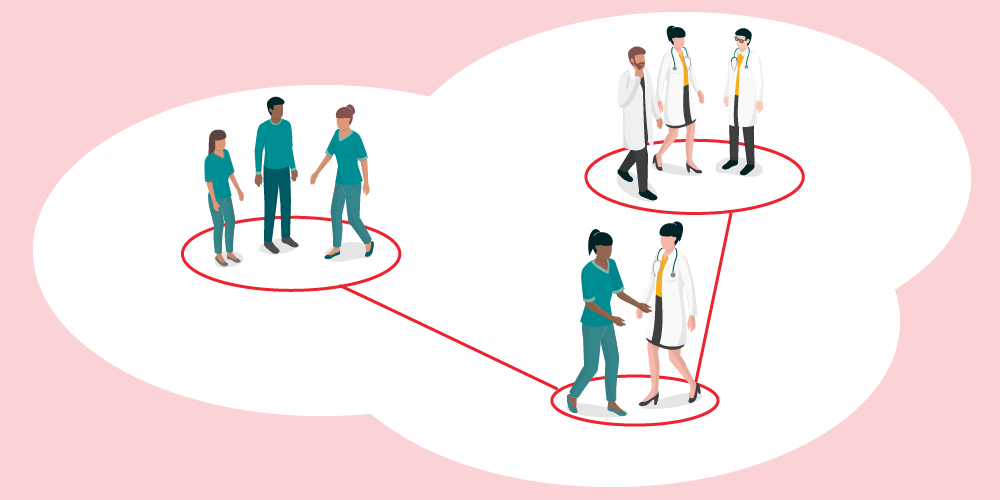risis has a way of bringing people together. Today, as in recent history, there are numerous accounts of positive social connection and community engagement in times of crisis. But what happens when the crisis endures?
When we reflect on the extended duration and isolation associated with coronavirus, we consider the new challenges this presents. To succeed, we will need strong and cohesive teams. The kind built on relationships that endure.
Now, more than ever, we can learn from the principles of relational leadership.
Relational leadership is an approach to leading that cultivates authentic relationships to achieve connection, common vision and interdependent action.
Traditional leadership methodologies focus on what you want to accomplish and how you should do it. Relational leadership adds additional emphasis on the “who” in addition to the what and the how of leading change. In fact, it starts with who. By building authentic connection on the human side of things, it then allows the how and what to function better. At the end of the day, it is our relationships that make us successful.
Manage self – identify strengths, preferences, identities and expressions
The first domain of relational leadership centers around the concept of raising one’s own awareness of self and then determining actions and steps to manage how we show up in our professional lives. Managing self includes developing a keen understanding of our strengths, work preferences, identities and expressions and gaining insight to how they manifest and affect others in our work. In this domain, leaders seek to enhance their resilience and adaptability to optimize their effectiveness and connection with those around them.
Foster teamwork – cultivate psychological safety
One of the core tenets of relational leadership is fostering teamwork. And fostering teamwork does not mean focusing on the very positive experiences, it also means confronting difficult conversations, and making it safe for people to do that. We are responsible for cultivating psychological safety on our teams. Still, it remains a missing element on many of the teams we work in.
The prescribed model of care says that everyone is supposed to play a certain role, and within those roles you are allowed (or not allowed) to say certain things. Relational leadership asks every member of the team to create a space where each member is OK to bring concerns to the team, and even challenge ranking members like charge nurse or physician or pharmacist. That ability to question and to speak up, without fear of retribution, is at the heart of relational leadership.
Coach and develop each other – small, incremental improvements
Over the years we’ve learned that small shifts in behavior can make a big difference for people, not just on our own teams, but in medical practice in general. Relational leadership asks us to start making those small changes now, in our own spheres of influence—however large or small those may be. By coaching and developing others and being coaches ourselves, each member of the team improves and advances in a way that is meaningful for them and their teams.
Accelerate change – engage in practices that activate teams
As we better manage ourselves, enhance the effectiveness of our teams, and spend time coaching and developing others, we lay the foundation and create the mechanisms for change. That change occurs first in our own clinics and floors, then in our departments, and finally profound across our campus. These large scale changes begin with each of us making small changes in the way we interact with each other.
The Power of a Team Check-in
Use a team check-in to establish connection. A check-in is an intentional practice or quick question that teams use at the beginning of a meeting to bring purpose and connection.
Here are two things you can do right now to practice relational leadership.
-
Get to know your colleagues better by asking them why they are here and doing the work they do—get past the superficial level to find out what motivates them to do their work. Establishing that connection with a colleague allows you to develop a baseline of support, especially when things go wrong. The next time you or that person is grumpy, it allows you to remind yourself, “This person cares deeply about the work.”
-
Start thinking of yourself as a person who has influence, no matter where you are in the medical hierarchy. You can influence people, teams, and systems, even if you aren’t the Big-L leader on your team.
Interested in learning more? We’ve collaborated with partners across the county to create the Relational Leadership Initiative through the AVP Office of Health Sciences Education. Click here to learn more about relational leadership at U of U Health.
Kyle Turner
Michelle Vo
What can 15 years of team-building leadership teach you? A lot. Expressive therapies manager, Holly Badger supervised the Huntsman Mental Health Institute's (formally known as the University Neuropsychiatric Institute) ROPES Course before becoming a manager of UNI's Expressive Therapy program. Here, Holly gives Accelerate a crash course in building community while strengthening a team.
Learners, patients, and teachers are more confident and inspired when we take time to create positive learning environments. Pediatric endocrinologist Kathleen Timme gives practical advice for integrating key aspects of a positive learning environment into your daily interactions.
Altruism and collectivism got us through the first year of Covid-19. Now what? As anger and resentment bubbles up on the frontline, VA internist Amy Cowan addresses our short fuse by sharing a simple practice for leading daily huddles to foster a bridge to better understanding.
